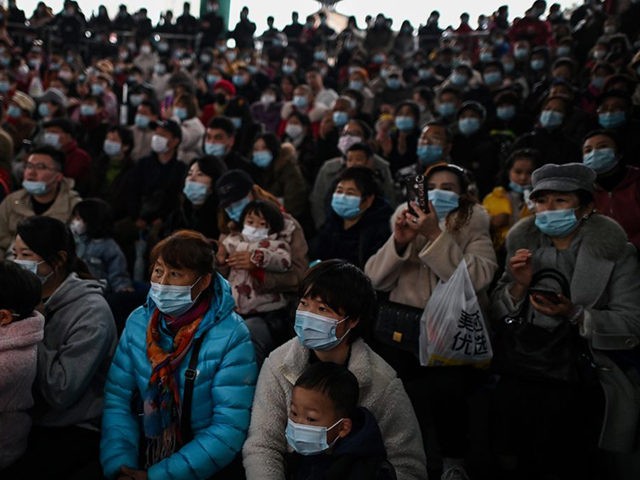A week after news reports began surfacing of a growing Chinese coronavirus outbreak in southern Yunnan province, Chinese state media confirmed Thursday that the Communist Party chief in Ruili, the city where the outbreak began, lost his job for “serious negligence in epidemic control.”
Dictator Xi Jinping declared an official end to the Chinese coronavirus epidemic in Wuhan, central Hubei province, in March 2020, visiting the city months after the worst of the outbreak had ended there. Beijing has repeatedly attempted to project an image of total control over the pandemic since then, evading complete counts of coronavirus cases while occasionally admitting to the reality that widespread infections were ongoing. China most dramatically attempted to claim a complete victory over the epidemic with a mass celebration in Wuhan for New Year’s Eve, covered extensively around the world with more fanfare than the subsequent outbreak that followed the super-spreader event.
The current outbreak is occurring in a province that borders Myanmar, currently rocked by protests and a violent military response after a coup deposed its democratically elected government in February.
The Chinese state-run Global Times publication revealed on Thursday that the head of the Communist Party in Ruili, Gong Yunzun, had lost his job over the health situation there, an embarrassment for Beijing. As of Thursday, the newspaper claimed the city had documented 76 coronavirus cases “and 25 asymptomatic patients;” the newspaper did not clarify if this meant officials had confirmed 100 cases or if the 25 were counted in the 75 total. Ruili has a population of about 300,000 people.
The propaganda outlet claimed that Gong’s dismissal was not just the result of the current outbreak, but of the fact that today’s is the third such incident in the past six months there.
“Gong took the post of Party Committee Secretary of Ruili in April 2018. He has now been demoted to a first-level researcher,” the newspaper reported. The notification did not suggest any further action, such as prosecution, though the Party under Xi has moved routinely to prosecute individuals considered potential threats to Xi on dubious charges of “corruption” following limited investigations.
China Daily, another government propaganda outlet, accused Gong personally of having “seriously impacted and damaged the overall situation of epidemic prevention and control in the whole country,” citing the local Party officials who removed him from office.
Following the local official’s removal, Beijing announced a major deployment of health workers from other parts of the country into Ruili to prevent the outbreak from further embarrassing the regime.
“Thousands of medics have been called in to join the anti-pandemic fight in Ruili, China, where a new cluster of COVID-19 [coronavirus] cases have recently been reported,” the state-run Xinhua news agency reported Wednesday. “The city has also been conducting large-scale nucleic acid testing along with home isolation, vaccination and epidemiological survey to curb the epidemic.”
Gong and the mayorship of Ruili had moved to completely lock down the city last week, and shut down border crossings, after doctors began rapidly confirming coronavirus cases, some in a sizeable number of Myamar citizens who appear to have crossed the border in the chaos following February’s military coup. The lockdown banned all businesses from opening other than markets for food and drugs and prevented individuals from leaving their homes, save for a once-a-day trip by one person in each household for food and other necessities. Reports rapidly began surfacing of desperate residents fighting over food in supermarkets.
Local officials also made the outrageous promise that they would vaccinate the entire population of Ruili in five days last week, broadcasting images allegedly of long lines of enthusiastic residents waiting for coronavirus vaccine candidate doses. China has approved five different vaccine candidates for widespread use domestically and focused largely on exporting two of its candidates — “Coronavac,” by the firm Sinovac Biotech, and a competitor from the firm Sinopharm — to allied and underdeveloped nations. Coronavac is notoriously the least effective vaccine currently available on a global scale, testing at only 50.38 percent efficacy; vaccines must pass a 50-percent threshold for most experts to consider them worth approving.
“No detailed efficacy data of Sinopharm’s [Chinese coronavirus] vaccine has been publicly released but its developer, Beijing Biological Products Institute,” Reuters reported in late March, “said the vaccine was 79.34% effective in preventing people from developing the disease based on interim data.”
In comparison, both vaccines developed by American companies Pfizer and Moderna tested at over 94-percent efficacy in preventing infections.
While the Communist Party has successfully convinced dozens of countries to purchase its homemade vaccine candidates, vaccination rates in China have stagnated, in large part due to Chinese citizens’ high levels of distrust in Chinese-made pharmaceutical companies. Prior to the coronavirus pandemic, Beijing was contending with a major scandal in which Changsheng Biotechnology, a Chinese company, was caught watering down doses of basic children’s vaccines to make a profit, leaving as many as 1 million children exposed to diseases like whooping cough (pertussis) and rabies. The incident caused widespread outrage at the Communist Party and, in at least one case, a gang beating of a local Communist Party official at the hands of angry parents.
Low interest in China’s coronavirus vaccine candidates is also a product of Beijing repeatedly claiming it had defeated its internal coronavirus outbreak, giving the impression that a vaccine is unnecessary.
To combat vaccine apathy, some local officials have begun either bribing residents with food and other gifts or threatening them with public shamings if they opt out of vaccination.

COMMENTS
Please let us know if you're having issues with commenting.